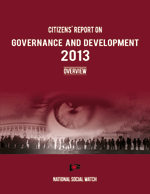Book Review: Citizens Report on Governance and Development 2013
Published on Sat, 2014-05-31 00:00
Book Review By Prof Kuldeep Mathur The Citizens Report on Governance and Development 2013 is the seventh Citizens’ Report of National Social Watch. Democracy is not an easy system of governance. It is fragile and its essence cannot be guaranteed only because there is an assurance of periodic elections. Its fragility is dependent on several factors among whom is the way its governing institutions function and the kind of policies that are determined by them. This requires constant vigilance lest the people who come into power and institutions that they oversee function according to the mandate given to them by the people who have elected them go astray. This vigilance can be exercised only if there is information available to the people. Thus, transparency and availability of information is critical to hold then accountability. National Social Watch in this volume entitled “Citizens’ Report on Governance and Development 2013” has put together very useful public information about governing institutions that can help the citizens to raise issues about their functioning and help in framing much needed reforms. There is not only wealth of information but competent analysis of policies that are being framed. It is now being increasingly recognized that democracy will function better and governance more effective if government comes closer to the people. Political parties are slowly imbibing the idea that good governance is also good politics. This Report will hopefully hasten this process. The Report provides information on the Parliament, the Executive, the Judiciary and the Local government institutions. In this way, it covers a wide spectrum and includes the four institutional pillars of governance in the country. Each of these institutions is scrutinized for its effectiveness and efficiency and data presented on how each functions. The Report clearly suggests that all these institutions are facing tremendous challenges. Some of these are embedded in the design and structure of these institutions; others in the motives and incentives of the people who operate in them. Wide ranging reforms are required and these can come on the public agenda when public has adequate information. This is the task that this Report fulfills in great measure. Prof. Kuldeep Mathur was a former Professor of Political Science, Centre for the Study of Law & Governance, Jawaharlal Nehru University, New Delhi. He is the author of many books and reports on the wide range of issue such as Governance, Democracy, Policy Research, and Public Administrations. Source: Countercurrents.org |


